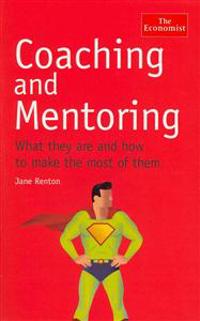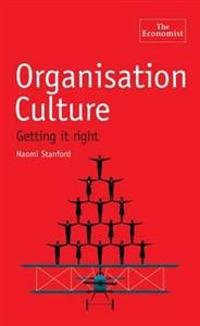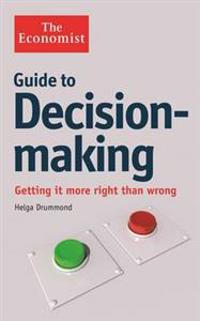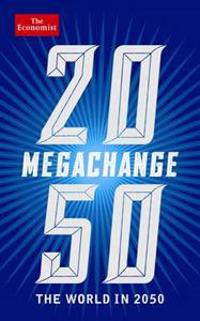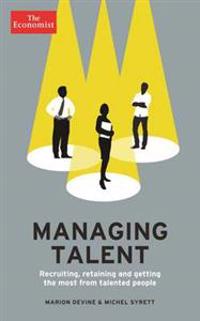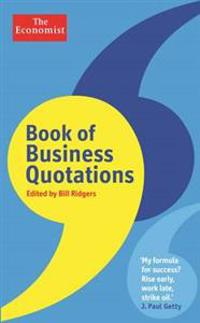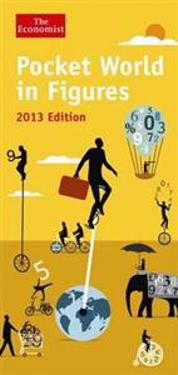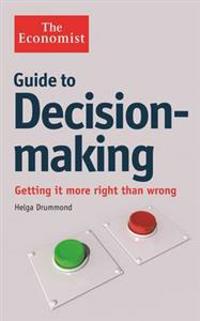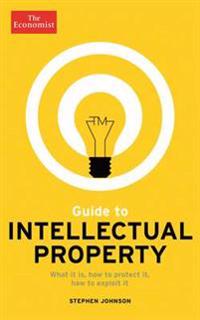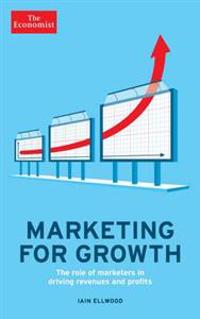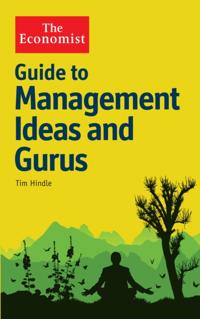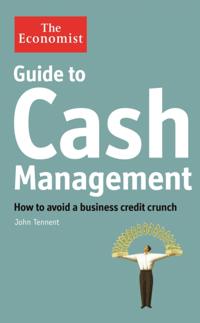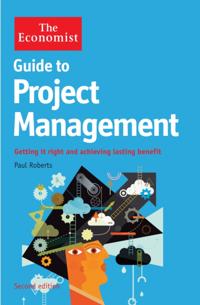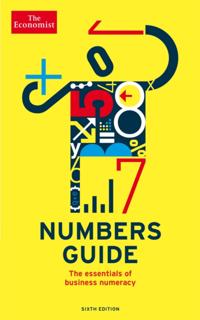Economist: Coaching and Mentoring (häftad)
ISBN: 9781846681899 - UTGIVEN: 2009-08Coaching has become mainstream. This guide explains what coaching, and its cheaper and simpler alternative, mentoring are, outlining the different types of coaching and their cost. It also assesses the effectiveness of coaching and mentoring.[...]
The Economist: Marketing (häftad)
ISBN: 9781846681936 - UTGIVEN: 2009-08Even though organisations have become increasingly marketing-focussed in their approach - and it is clear that marketing is more than just the 'marketing department' - marketing is one of the most misunderstood areas of business. Philip Kotler, an American marketing guru, defines it as 'the business[...]
Economist: Organisation Culture (Häftad)
avNaomi Stanford
ISBN: 9781846683404 - UTGIVEN: 2010-07An organisation's culture either gives it a competitive advantage or a competitive disadvantage. That is why managers are putting more and more emphasis on getting their organisation's culture right. This book includes a series of exercises that can help managers analyse and make their organisation'[...]
The Economist Guide to Decision-making (häftad)
ISBN: 9781846683756 - UTGIVEN: 2012-07We make decisions, and these decisions make us and our organisations. And in theory, decision-making should be easy: a problem is identified, the decision-makers generate solutions, and choose the optimal one - and powerful mathematical tools are available to facilitate the task. Yet if it is all so[...]
The Economist: Megachange
ISBN: 9781846685637 - UTGIVEN: 2012-03What will the world look like in 2050, and how will we get there? This comprehensive and compelling book covers the most significant 'megachanges' that are shaping the coming decades, with each of its twenty chapters elegantly and authoritatively outlined by Economist contributors, and rich in suppo[...]
The Economist: Managing Talent (häftad)
ISBN: 9781846685897 - UTGIVEN: 2014-02Survey after survey confirms how the success of businesses has become increasingly dependent on the ability and skills of their staff. And because talented workers are in short supply the hunt for people of unusual ability will continue in earnest. Hiring such people is the relatively easy part; kee[...]
Economist Book of Business Quotations (Inbunden)
avBill Ridgers
ISBN: 9781846685934 - UTGIVEN: 201206Contains handy wit and wisdom from across the world of business. Including subjects from e-commerce, strategy and investment, to management speak, business travel and business schools, this title brings together history's smartest insights from people ranging from CEOs and politicians to novelists a[...]
Pocket World in Figures (Inbunden)
avEconomist
ISBN: 9781846685996 - UTGIVEN: 201209This is a new edition of this annual bestseller of fascinating facts and figures about the world we live in. The 2013 edition of this perenial favourite has been completely updated, revised an expanded with many new features. Full of facts and figures about the world today on subjects as diverse as [...]
The Economist Guide to Better Decision-making (Inbunden)
avHelga Drummond
ISBN: 9781846688942 - UTGIVEN: 201108An invaluable guide to arrive at better business decisions. We make decisions, and these decisions make us and our organisations. And in theory, decision-making should be easy: a problem is identified, the decision-makers generate solutions, and choose the optimal one - and powerful mathematical to[...]
The Economist Guide to Intellectual Property (häftad)
ISBN: 9781846688973 - UTGIVEN: 2015-06IP accounts for an estimated $5trn of GDP in the US alone. It covers patents, trademarks, domain names, copyrights, designs and trade secrets. Unsurprisingly, companies zealously guard their own ideas and challenge the IP of others. Damages arising from infringements have fostered a sizeable claims [...]
The Economist Numbers Guide 6th Edition (häftad)
ISBN: 9781846689031 - UTGIVEN: 2013-12Designed as a companion to The Economist Style Guide, the best-selling guide to writing style, The Economist Numbers Guide is invaluable for everyone who has to work with numbers, which in today's commercially focussed world means most managers. In addition to general advice on basic numeracy, the g[...]
The Economist: Marketing for Growth (Häftad)
ISBN: 9781846689055 - UTGIVEN: 2014-01Marketing for Growth is a guide to how the marketing function within a business can and should become its most important driver of growth. Marketers play a crucial role in generating revenue and they can play an equally important role in how revenues translate into profit. Growth is also about becom[...]
Economist: Brands and Branding
ISBN: 9781847650009 - UTGIVEN: 2015-06Although the balance sheet may not even put a value on it, a company's brand or its portfolio of brands is in many cases its most valuable asset, accounting for as much as 70% of a firm's market value in some cases. This book argues that because of this and because of the power of not-for-profit bra[...]
Economist Guide to Management Ideas and Gurus
ISBN: 9781847650399 - UTGIVEN: 2015-06This insightful guide, which has proven hugely popular around the world in hardback, not only includes the most significant ideas that have influenced the management of business over the past century, but it also includes entries on the most influential business thinkers of the past and present. Ent[...]
Economist Guide to Cash Management
ISBN: 9781847651815 - UTGIVEN: 2012-03The credit crunch highlighted to businesses the importance of cash management, as those firms which ran short of cash discovered when they found themselves in trouble or even went bust.This tightly-written guide clearly explains the six critical aspects of the effective management of cash and cash f[...]
Economist Guide to Decision-Making
ISBN: 9781847656612 - UTGIVEN: 2015-06We make decisions, and these decisions make us and our organisations. And in theory, decision-making should be easy: a problem is identified, the decision-makers generate solutions, and choose the optimal one - and powerful mathematical tools are available to facilitate the task. Yet if it is all so[...]
Economist: Megachange
ISBN: 9781847658050 - UTGIVEN: 2012-03In 2050 there will be 9.3 billion people alive - compared with 7 billion today - and the number will still be rising. The population aged over sixty-five will have more than doubled, to more than 16 per cent; China's GDP will be 80 per cent more than America's; and the number of cars on India's road[...]
Economist Guide to Project Management 2nd Edition
ISBN: 9781847659118 - UTGIVEN: 2013-01From the Hubble space telescope that was launched with a malfunctioning device that resulted in all the pictures it took being blurred, to the extremely late completion of England's new national soccer stadium at Wembley, history is full of example of projects that damaged organisations because they[...]
Economist Numbers Guide 6th Edition
ISBN: 9781847659347 - UTGIVEN: 2013-12Designed as a companion to The Economist Style Guide, the best-selling guide to writing style, The Economist Numbers Guide is invaluable for everyone who has to work with numbers, which in today's commercially focussed world means most managers. In addition to general advice on basic numeracy, the g[...]
The Skeptical Economist: Revealing the Ethics Inside Economics (Pocket)
avJonathan Aldred, Aldred
ISBN: 9781849712095 - UTGIVEN: 2010-09-17Challenges us to examine the assumptions behind the economics of our current way of life. Responding to Western malaise about quality of life, and a growing curiosity about economics and its relevance to these concerns, the author argues that economics is not an agreed body of knowledge or an object[...]
Economics in Terms of the Good, the Bad and the Economist (häftad)
ISBN: 9781921917028 - UTGIVEN: 2012-11An Economist's Guide to Economic History (häftad)
ISBN: 9783319965673 - UTGIVEN: 2018-12Without economic history, economics runs the risk of being too abstract or parochial, of failing to notice precedents, trends and cycles, of overlooking the long-run and thus misunderstanding `how we got here'. Recent financial and economic crises illustrate spectacularly how the economics professio[...]
The Russian Social-Democratic Labour Party, 1899 1904: Documents of the 'Economist' Opposition to "Iskra" and Early Menshevism
ISBN: 9789004218789 - UTGIVEN: 2015-05Fakta och myter om globaliseringen (Häftad)
avAnders Åslund, The Economist
ISBN: 9789175663838 - UTGIVEN: 1998-01-01Alla talar vi om globaliseringen. Men vad är egentligen globalisering? Hur omfattande är den? Hur påverkar den oss?Frågorna står i centrum i den artikelserie från The Economist som publicerades under hösten 1997 och som här återges i svensk översättning. The Economist är världens kanske[...]

